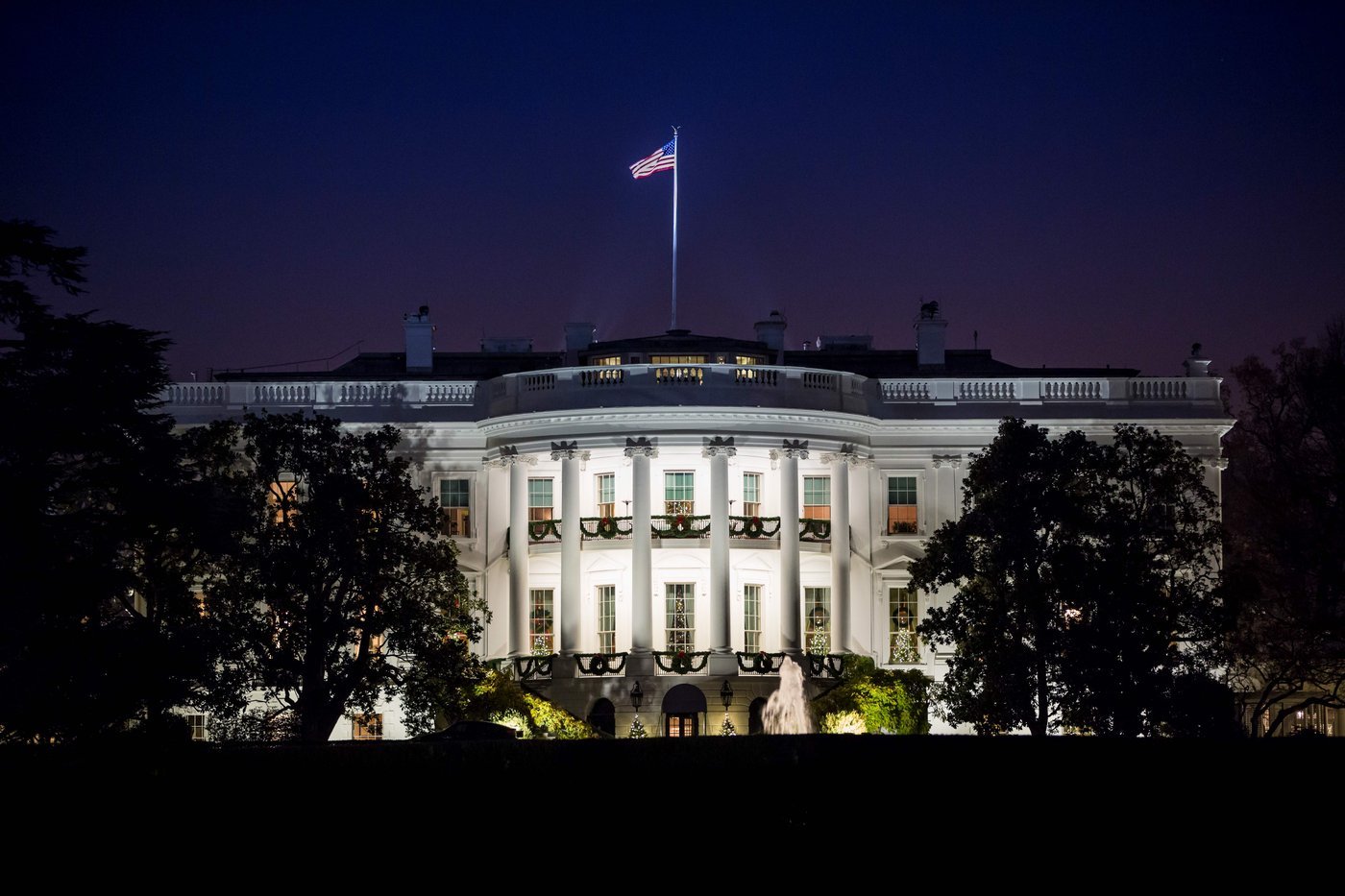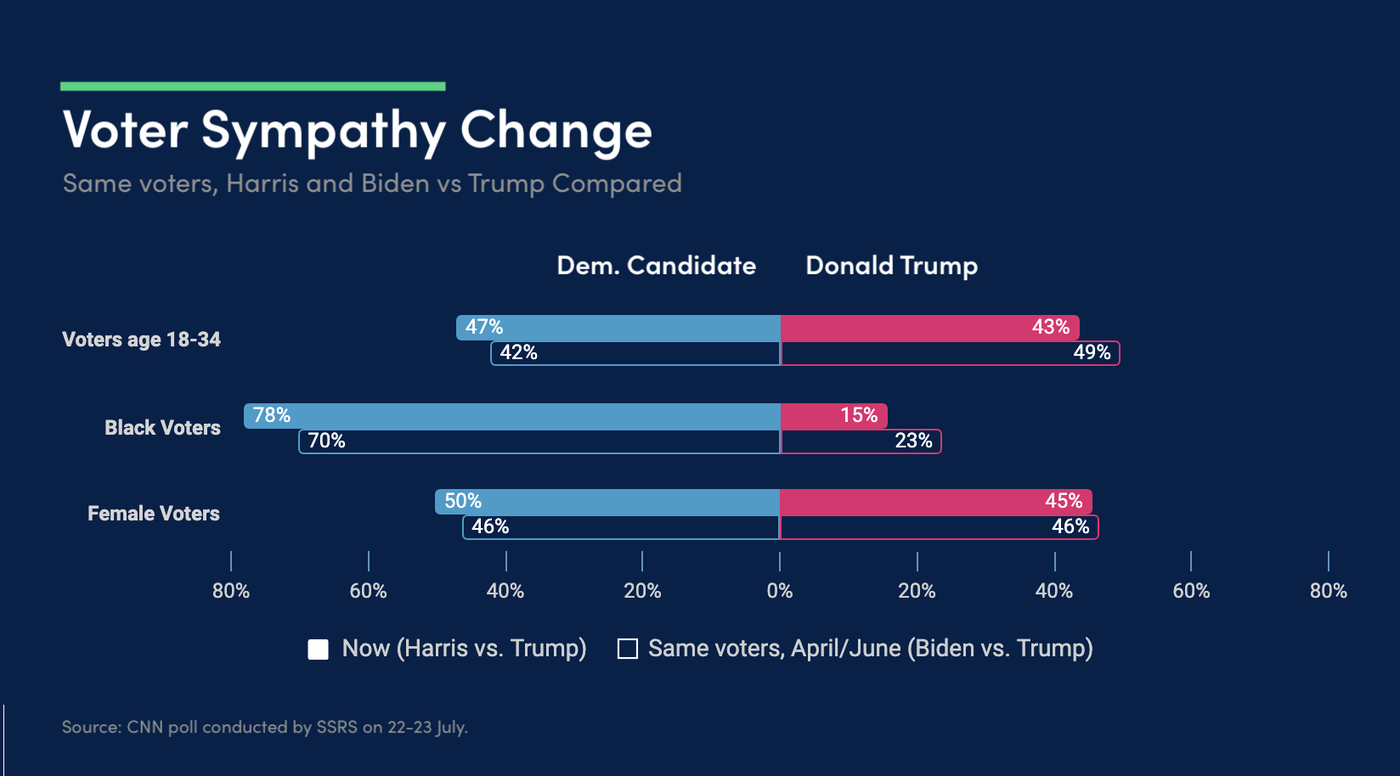A look at Kamala Harris’ role as vice president and her policy positions earlier in her career. What are her views and how would these affect the financial markets if she is elected president?
Editor’s note:
This article has been updated to reflect recent events in the Presidential race. The original article was originally written by Kenny Fisher and published on August 8, 2024.
Learn more about the US Election and Financial Markets.
Test What A Harris Election Might Mean To Financial Markets header text
The sudden withdrawal of President Joe Biden for reelection has turned the presidential campaign on its head, and US Vice-President Kamala Harris will now face Republican candidate Donald Trump in the November 2024 election.
Harris identifies with the progressive wing of the Democratic Party, which seeks more radical change than “centrist” Democrats such as President Biden. As vice-president, Harris has supported Biden’s policies but advocated progressive policies earlier in her career.
As US president, will Harris advance progressive policies or will she shift closer to the center of the Democratic Party? The answer to this question could have significant implications for the financial markets.
Learn more about the US Election and Financial Markets.
Harris as Vice President
Traditionally, the US vice president is expected to support and promote the policies of the president. Harris has acted as a key advisor for President Biden on both domestic and foreign policy, but at the end of the day, the vice presidency is a supporting role and Harris has worked in Biden’s shadow over the past four years.
In her role as vice-president, Harris has dutifully supported the policies of the Biden administration but will have to forge her own identity as a presidential candidate and clearly lay out her positions on key issues if she is to beat Donald Trump. Thus, the election campaign in the coming months will shed light on what policies Harris might pursue as president. Let’s take a look at some of the key issues that Harris will have to deal with as the Democratic nominee and, if she wins the election, as president.
Harris: The US Presidential Election Democrat Candidate
As of August 2nd, Kamala Harris is now the Democratic nominee for president, having secured the nomination at the Democratic Convention. Harris has already energized the Democratic Party, which had faced concerns about President Biden’s ability to run for re-election due to ongoing questions about his age and health.
The Democrats have risen in the polls since President Biden has announced he will not seek reelection and Harris became the frontrunner nominee. The key question is whether this momentum will continue in the coming months. Harris and Trump are in a dead heat according to the polls, which should make for an exciting race to the White House.
Harris and Climate Change
During her unsuccessful presidential campaign in 2020, Harris said she opposed offshore drilling and fracking, a process that fractures rock for oil and gas extraction. Harris also said that as president, she would ban oil and gas leases on public lands.
Harris can point to her strong record on supporting environmental initiatives and combating climate change. As a United States senator, Harris co-sponsored the Green New Deal, which was introduced in February 2019 during the Obama administration. This non-binding proposal urged the federal government to slash greenhouse gas emissions and to transition to 100% clean energy within 10 years.
President Biden has taken steps to replace fossil fuel energy with green energy and cut US greenhouse gas emissions in half by 2030. As president, Harris is likely to continue this policy or move even more quickly than Biden to reduce oil and gas dependence and combat climate change.
Harris’s support for the environment stands in sharp contrast to Donald Trump’s stance on the environment. As president, Trump downplayed climate change, rolled back domestic environmental legislation and withdrew from the Paris climate agreement. Trump strongly supports domestic oil development and is in favor of selling oil and gas leases on public lands.
Harris’ pledges will be expensive to implement and the financial markets will not like the extra costs that industry and businesses will incur to finance these environmental initiatives.
Harris and Economic Policy
Wealth Tax Proposal
Harris has supported progressive economic policies, which include a national wealth tax. In March 2024 the Biden administration released a budget proposal which called for an annual 25 percent minimum tax on individuals with income and assets above $100 million.
Harris has said that the budget proposal was put forward by President Biden and herself. Would she try to push a wealth tax through Congress if elected president?
The wealth tax proposal, which would raise tax rates on the wealthy, would mark a major departure from current US tax policy. Harris could turn “taxing the rich” into a major issue in the election campaign. This policy is diametrically opposed to that of Donald Trump and the Republicans, who strongly oppose any tax hikes.
Minimum Wage Increase Proposal
President Biden has tried to raise the federal minimum wage from $7.25 to $15 per hour but has run into resistance in Congress. Harris is on record as supporting a $15 minimum wage and would likely renew efforts to achieve this goal as president.
Many business owners, however, are strongly against such a steep increase, arguing that it would force them to let workers go or even close their businesses altogether. As with a wealth tax, a huge increase in the minimum wage would face an uphill battle in Congress.
Harris and Trade Policy
Commitment to Multilateral Trade
Under the Biden administration, the cornerstone of US trade policy has been multilateralism, which involves trade agreements between several nations. This approach calls for closer relationships between the US and its trading partners and for international cooperation in global trade.
As president, Harris can be expected to continue developing trade with other countries through multilateralism, which involves trade agreements between several countries. Harris may put her own stamp on trade policy by utilizing trade agreements to improve worker rights (both in the US and abroad) and protect the environment even more than the Biden administration.
This cooperative approach to trade policy would be at complete odds with Trump’s stance, which is one of “America First” and does not consider worker rights or the environment as priorities.
Harris Foreign Policy Stance
As vice president, Harris has had limited exposure to foreign policy compared to President Biden, who has decades of experience. Harris has spent the last four years implementing Biden’s foreign policy agenda and does not have a definitive stance on foreign policy issues.
The US voter is more concerned about domestic issues such as inflation than international relations, but the conflict in Ukraine is an international hotspot with US involvement, and Harris will have to outline her view on the Ukraine war and other global issues during the election campaign. This should provide a better understanding of Harris’ views on foreign policy issues.
Harris’ Position on the Russia-Ukraine War
The war between Ukraine and Russia has dragged on for over two years with no end in sight. President Biden has been a strong supporter of Ukrainian President Volodymyr Zelenskyy and Harris has already demonstrated her support for Ukraine. After Harris became the prospective nominee, her first call to a foreign leader was to Zelenskyy’s chief of staff. This stance stands in sharp contrast to that of Donald Trump, who has called for ending US aid to Ukraine.
Harris: 'It is time' to End the War in Gaza
The war between Israel and Gaza has lasted close to a year and tensions are simmering between Israel, Lebanon and Iran. President Bide has shown strong support for Israel but has also demanded that Israel take extreme care to minimize civilian casualties in Gaza.
Harris has been more critical than Biden about Israel’s handling of the war in Gaza. As president, Harris will likely continue US military and financial support to Israel, but may be more confrontational with Israel’s right-wing government than Biden.
The Migration Issue
In 2021, the Biden administration was faced with an influx of illegal immigration from Mexico into the United States. Many of the migrants originated from Central America; in particular, El Salvador, Guatemala and Honduras. President Biden mandated Harris to find solutions to the root causes of migration from Central America.
Harris was never in charge of the border with Mexico, but nonetheless, both Republicans and Democrats criticized her over the acute migration crisis at the border, as illegal immigration reached new records under the Biden administration. The Republicans have labeled her as a “border czar” who failed to stem illegal immigration and are expected to intensify these attacks during the election campaign.
As president, Harris can be expected to follow Biden’s lead and advocate a humane response to illegal immigration from the Mexican border. This could mean conducting negotiations over migration with Mexico, El Salvador, Guatemala and Honduras. Harris has been vocal about human rights for illegal immigrants and as a presidential candidate in 2019 she presented a plan to protect millions of illegal immigrants from deportation.
Harris’ stance contrasts sharply with Donald Trump’s pledge to deport millions of illegal immigrants if elected president.
The US presidential election in November 2024 has been thrown into disarray after President Biden decided not to run only four months before Election Day. US Vice-President Kamala Harris is the heavy favorite to become the Democratic presidential nominee and will face Republican Donald Trump.
Harris has been part of the progressive wing of the Democratic Party, but as vice-president she has supported the policies of Biden, who is more to the center. Harris is expected to differentiate herself from Biden, although it’s an open question whether she will adopt a more left-wing stance than Biden or move to the center if she is elected president.
Disclaimer
This article is for general information purposes only, not to be considered a recommendation or financial advice. Past performance is not indicative of future results.
Opinions are the author's; not necessarily that of OANDA Corporation or any of its affiliates, subsidiaries, officers or directors.
Leveraged trading in foreign currency contracts or other off-exchange products on margin carries a high level of risk and is not suitable for everyone. We advise you to carefully consider whether trading is appropriate for you in light of your personal circumstances. You may lose more than you invest. We recommend that you seek independent financial advice and ensure you fully understand the risks involved before trading.











